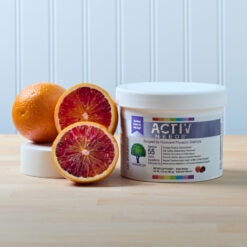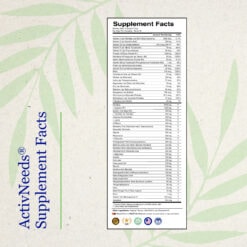$84
Lysine
Lysine is an essential amino acid that is obtained solely from the diet. It is present and required in all proteins. Lysine is present in high amounts in animal products and low in grains including rice, wheat, and corn. Lysine is the amino acid most likely to be deficient on plant-based diets, and lysine deficiency is common in vegans. Lysine competes with arginine to prevent and heal sores from herpes viruses. Small studies have shown improved control of blood sugar and reduced anxiety. Lysine is likely safe up to 3,000 mg per day. Side effects are unlikely in the dosing (500 mg) present in ActivNeeds. People with frequent outbreaks of herpes virus should discuss with their physician adding another 2-3 grams of lysine per day.
Lysine in ActivNeeds
Lysine is added to ActivNeeds in order to provide a wide basis of nutrition. Lysine is the amino acid most likely to be deficient on plant-based diets. However, the primary reason for lysine in ActivNeeds is to act as a counterweight against arginine to prevent inducing herpes reactivation. Arginine is an essential component in ActivNeeds.
Lysine is an essential amino acid that cannot be made by our bodies and thus must come from the diet. Lysine is present in high amounts in animal products such as meat, fish, dairy, and eggs.
Lysine is present and required in all proteins. In addition, lysine assists the body to absorb calcium, iron, and zinc.
Lysine deficiency is not rare in vegans, in particular since grains including rice, wheat, and corn are low in lysine. Symptoms can include fatigue, irritability, loss of concentration, nausea, poor growth, infertility, anemia, and hair loss.
Lysine might also prevent the herpes virus from growing. Taking lysine by mouth might help prevent and heal cold and genital sores from herpes viruses. Lysine likely interferes in the formation of viral capsid proteins via competitive antagonism with arginine [https://bpspubs.onlinelibrary.wiley.com/doi/full/10.1111/bcp.15444]. Small studies have shown improved control of blood sugar and reduced anxiety. Lysine is sometimes used to improve athletic performance, stimulate hair growth, and promote wound healing.
Lysine is believed to be safe for most people when taken in doses up to 3,000 mg daily for up to one year. Lysine supplementation might cause stomach discomfort and diarrhea in people with the rare genetic disorder lysinuric protein intolerance. Nausea, abdominal pain, and diarrhea can occur with very high dosing over 10,000 mg a day. Side effects are unlikely in the dosing (500 mg) present in ActivNeeds.
Laboratory testing can test for lysine (plasma amino acids), but is generally not likely to have clinically utility, except if your diet is quite low in protein.
The dose of lysine in ActivNeeds is 500 mg. If you experience, frequent outbreaks of herpes virus, you may want to discuss with your physician adding another 2-3 grams of lysine in order to balance and overwhelm the arginine present in ActivNeeds [https://www.ncbi.nlm.nih.gov/pmc/articles/PMC6419779].
How and Why Lysine Is Used in ActivNeeds
Lysine is added to ActivNeeds in order to provide a wide basis of nutrition. Lysine is the amino acid most likely to be deficient on plant-based diets. Small studies have shown improved control of blood sugar and reduced anxiety. However, the primary reason for lysine in ActivNeeds is to act as a counterweight against arginine to prevent inducing herpes reactivation. Arginine is an essential component in ActivNeeds. Side effects of lysine are unexpected at the doses used in ActivNeeds.
Order ActivNeeds Today
Formulations










